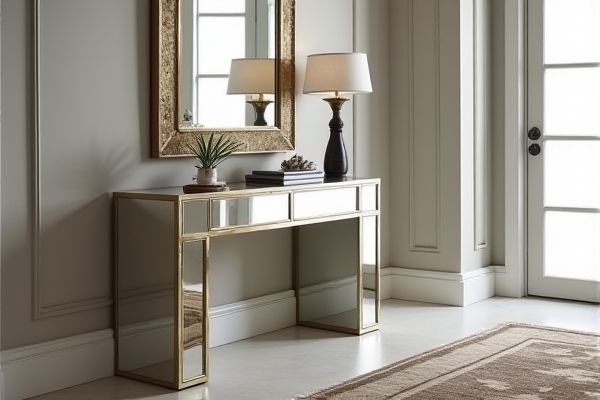
A mirrored console enhances your space with reflective surfaces that amplify light and create an illusion of openness, while a glass console offers a sleek, transparent look that complements modern decor and maintains a minimal visual footprint. Discover how choosing between these styles can transform Your room's ambiance and functionality by reading the rest of the article.
Table of Comparison
| Feature | Mirrored Console | Glass Console |
|---|---|---|
| Material | Reflective mirrored glass | Tempered or clear glass |
| Appearance | Glossy, reflective surface creating depth | Transparent or frosted, modern look |
| Maintenance | Shows fingerprints easily, requires frequent cleaning | Resistant to smudges, easier to clean |
| Durability | Fragile, prone to scratches and cracks | Highly durable, resistant to impact |
| Light Impact | Enhances room brightness via reflections | Allows light to pass, maintaining openness |
| Style | Elegant, luxurious, glamorous | Minimalist, sleek, contemporary |
| Cost | Typically higher due to glass treatment | Generally affordable and accessible |
| Best Use | Decorative focal points, stylish interiors | Functional spaces, minimalist designs |
Introduction to Mirrored and Glass Consoles
Mirrored consoles feature reflective surfaces that enhance light and create the illusion of spaciousness, making rooms appear larger and brighter. Glass consoles offer a sleek, modern aesthetic with transparent or tinted panels that provide a clean, minimalist look while showcasing decorative items. Both types serve as stylish, functional focal points in living spaces, blending practicality with contemporary design trends.
Key Differences Between Mirrored and Glass Consoles
Mirrored consoles feature reflective surfaces that enhance light and create the illusion of space, making rooms appear larger and brighter, while glass consoles typically use clear or tinted tempered glass for a sleek, modern look that emphasizes transparency and minimalism. Mirrored consoles tend to require more maintenance as they show fingerprints and smudges more easily compared to glass consoles, which are easier to clean but more prone to visible scratches. Structural differences include mirrored consoles often having a solid, weighted backing for stability, whereas glass consoles rely on tempered glass panels supported by metal or wooden frames for durability.
Aesthetic Appeal: Mirrored vs. Glass Designs
Mirrored consoles offer a reflective surface that enhances light and creates a striking, glamorous ambiance in any room, making them ideal for modern or luxurious interior designs. Glass consoles provide a sleek, transparent look that offers a minimalist and airy feel, complementing contemporary and classic decor styles while visually opening up the space. Both designs boost room aesthetics but differ in visual impact: mirrored consoles deliver bold sophistication, whereas glass consoles emphasize subtle elegance and versatility.
Durability and Maintenance Comparison
Mirrored consoles offer moderate durability but require frequent cleaning to prevent visible fingerprints and smudges, making maintenance more demanding in high-traffic areas. Glass consoles, especially tempered glass, provide superior durability and scratch resistance while being easier to clean with standard glass cleaners, ensuring long-lasting clarity and minimal upkeep. Your choice should consider the balance between aesthetic appeal and the time you can dedicate to maintaining a pristine surface.
Functional Uses in Home Decor
Mirrored consoles enhance home decor by reflecting light and creating the illusion of a larger space, making them ideal for smaller rooms or entryways. Glass consoles offer a sleek, modern look with transparent surfaces that blend seamlessly into various styles while providing easy maintenance and durability. Both types function as versatile accent pieces for displaying decorative items, adding storage, and organizing essentials in living rooms, hallways, or bedrooms.
Space Enhancement and Light Reflection
Mirrored consoles enhance space perception by reflecting surrounding areas, creating an illusion of expanded room size, while glass consoles maintain a sleek, unobtrusive look that visually opens up a space without adding bulk. The reflective surface of a mirrored console amplifies natural and artificial light, brightening your environment and making it feel more inviting. Glass consoles also reflect light but in a subtler way, contributing to a clean, airy atmosphere perfect for small or modern interiors.
Price Range and Value for Money
Mirrored consoles typically range from $150 to $600, offering a glossy, reflective surface that enhances room brightness but can be prone to fingerprints and scratches, impacting long-term value. Glass consoles, priced between $200 and $700, provide a sleek, modern look with varying degrees of tempered glass for durability, often delivering better resistance to wear and improved longevity. While mirrored consoles attract buyers seeking elegant aesthetics at a lower price point, glass consoles tend to offer greater value for money through superior durability and versatility in home decor.
Best Styles for Various Interior Themes
Mirrored consoles enhance modern and glam interiors by reflecting light and creating a sense of spaciousness, making them ideal for minimalist, contemporary, and luxury-themed rooms. Glass consoles offer a sleek, transparent look that complements Scandinavian, industrial, and transitional decor styles, providing an unobtrusive yet elegant surface. Both options serve as versatile focal points, with mirrored consoles adding a bold statement and glass consoles maintaining an airy, understated aesthetic.
Pros and Cons: Mirrored Console vs. Glass Console
Mirrored consoles enhance room brightness by reflecting light and creating an impression of spaciousness, but they can easily show fingerprints and scratches, requiring frequent cleaning. Glass consoles offer a sleek, modern aesthetic with durable tempered surfaces resistant to heat and stains, yet they may highlight smudges and require careful handling to avoid chips. Your choice depends on balancing aesthetic appeal with maintenance preferences and the desired ambiance of your interior space.
How to Choose the Right Console for Your Space
Choosing the right console involves considering both mirrored and glass options based on your space's lighting and style. Mirrored consoles enhance brightness by reflecting light, making them ideal for smaller or darker rooms, while glass consoles create an airy feel with a sleek, modern look perfect for open, minimalist spaces. Prioritize durability and maintenance; tempered glass offers strength and easy cleaning, whereas mirrored surfaces may require frequent polishing to maintain their shine.
 homyna.com
homyna.com